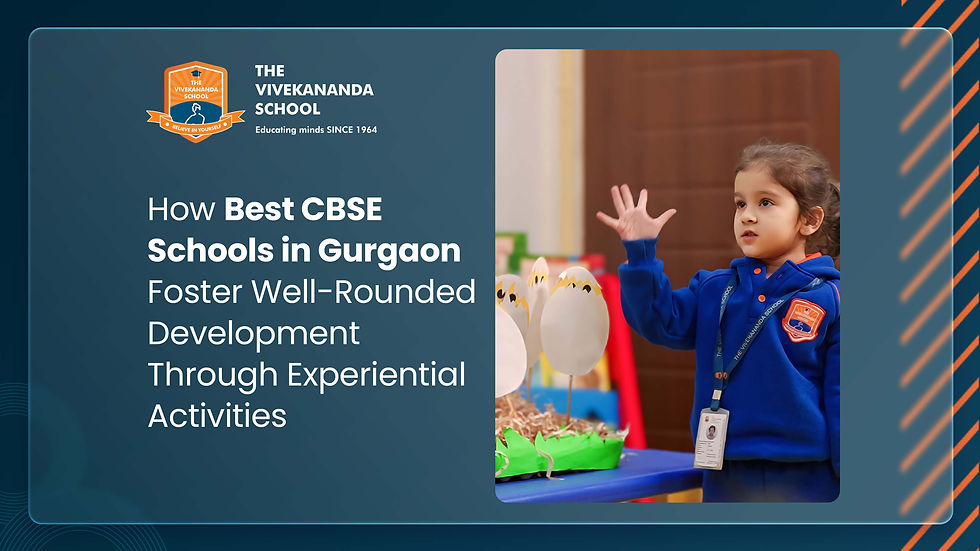The CBSE Global Curriculum 2026–27: A Future-Ready Approach at The Vivekananda School
- The Vivekananda Admission
- Jun 17, 2025
- 3 min read
Updated: Sep 25, 2025

At The Vivekananda School, we believe education must evolve with the times, preparing students not just for exams, but for life. In alignment with this vision, the CBSE Global Curriculum 2026–27 is a powerful step toward transforming Indian education into one that is inclusive, relevant, and future-ready.
Our Principal, Ms. Archana Pandey, Sector 69, Gurugram, Senior School, shares her insight on what CBSE as an educational board says and how this curriculum redefines learning by shifting focus from rote learning to reflective understanding, from rigid marks to flexible skills, and from memorization to meaningful, interdisciplinary engagement.
Here’s how as one of the best CBSE Schools in Gurgaon, The Vivekananda School is embracing the key pillars of the CBSE Global Curriculum:
From Rote Learning to Reflective Thinking
As one of the top schools in Gurgaon, learning at The Vivekananda School is no longer about cramming information. With this curriculum, students are encouraged to ask questions, explore solutions, and reflect on outcomes. It strengthens critical thinking and curiosity, skills that stay with learners for life.
Student-Centered and Modular Learning
The new structure allows students to take ownership of their learning journey. Flexible subject combinations, project-based choices and self-paced modules empower every Vivekian to follow their interests and strengths. This makes learning more purpose-driven and enjoyable.

Building Global Perspectives
Being one of the top rated schools in Gurgaon, at our campus, education has always gone beyond the classroom. The curriculum supports our efforts to teach global values from sustainability and peace to equity and diversity. Students are guided to think like global citizens, developing empathy, cultural awareness, and responsibility.
Emphasizing 21st-Century Skills
We are integrating essential life and career skills communication, collaboration, digital fluency, and creativity into our daily academic practices. These are no longer optional add-ons, but core components of classroom experiences at The Vivekananda School.
Making Assessment Meaningful
With the shift toward competency-based learning, assessments at our school will now measure understanding and application, not just recall. Continuous feedback and less pressure-driven evaluations will help every student grow at their own pace.
For Admissions: Grade 1 - Grade 12 Call +91 9560102881
Integrating Technology in Learning
Our campus is already equipped to support the blended learning model envisioned in the new curriculum. From AI-based learning tools to virtual labs and smart classrooms, technology is being used not just to teach but to transform how students learn.
Encouraging Experiential and Interdisciplinary Learning
Real-world relevance is at the heart of the new curriculum. As one of the best schools in Gurgaon, students at The Vivekananda School are encouraged to engage in projects, research, hands-on activities, and cross-subject learning that connect theory to practice, classroom to community.
We are proud to be at the forefront of this educational transformation. The journey ahead is exciting, and with the right blend of values, vision, and innovation, we are confident that our students will lead the way in shaping a better tomorrow.
Aspect | Traditional Curriculum | CBSE Global Curriculum (at The Vivekananda School) |
Learning Approach | Rote memorization | Reflective thinking, inquiry-based learning |
Focus | Marks and exams | Skills, understanding, application |
Student Role | Passive learner | Active, self-directed learner |
Teaching Style | Teacher-centered | Student-centered and modular |
Subject Structure | Fixed combinations | Flexible subject choices, interdisciplinary approach |
Assessment | Recall-based, exam-oriented | Competency-based, continuous feedback |
Technology Integration | Limited | AI tools, virtual labs, smart classrooms |
Skill Development | Not emphasized | 21st-century skills: communication, creativity, digital fluency |
Global Perspective | Local/national focus | Global values: sustainability, peace, diversity |
Learning Method | Textbook-driven | Experiential, project-based, real-world relevance |
Pace of Learning | One-size-fits-all | Self-paced, based on student strengths |
Purpose of Education | Academic performance | Holistic growth with empathy, awareness, and responsibility |
.png)







Comments